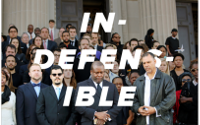Falling Short of Our Ideals
- News
"The right way is not always the popular and easy way. Standing for right when it is unpopular is a true test of moral character." –Margaret Chase Smith
It seems the more we hear the stories, the more inevitable Martin Luther King, Jr.'s accomplishments become. We can rattle off the biographical landmarks: the Montgomery bus boycott, the multiple nights in prison, the March on Washington; we recite important dates and read his words adorning motivational posters on our office walls. Not only do these recollections burrow into our collective sense of history, but they induce us into a sort of complacency about our own time.
If we allow ourselves to believe MLK, Jr. was predestined to live a life worth memorializing, it diminishes our appreciation for the risks he endured. This failed appreciation not only does a disservice to the man, but also enables us to be complacent to the injustices of our own time. To borrow from his own words, we see the "whole staircase" of his life's work without applying that same faith to our own "first step."
PBS: Fifty Years After Gideon
- News
"The Supreme Court's unanimous 1963 decision in Gideon v. Wainwright required that everyone accused of a serious crime, rich or poor, is entitled to a defense lawyer. The decision spawned a nationwide public defender system aimed at insuring that poor people get adequate legal representation at taxpayer expense, if necessary. But 50 years later, are indigent defendants getting the representation they deserve?" -- PBS
PBS' Tim O'Brian discusses the landmark case and talks with Chief Defender Derwyn Bunton on the state of public defense in New Orleans. 2013 may be over, but the need for a fair and just criminal justice system, one that fully supports public defense, has never been greater.
Watch here at PBS...
Chief Public Defender Sounds Off: Time to fix a ‘perverse’ system of justice
- News
Funding for public defense in New Orleans (and throughout Louisiana) is inadequate, unreliable and unpredictable. And I am not the only one who thinks so.
In a 2006 report titled "An Assessment of the Immediate and Longer-Term Needs of the New Orleans Public Defender System," the federal Bureau of Justice Assistance wrote, "It is imperative that a stable and adequate funding source be established for the [Orleans Public Defender's Office.] Without that commitment, it will remain impossible to provide defendants with the representation to which they are constitutionally entitled." In a follow-up report in 2010, the bureau wrote, "The OPD's funding must be stable, dependable and adequate. ... No one seems to know how much to expect from any source during the current year or in the future."
In 2012, an independent evaluation commissioned by the Louisiana Public Defender Board said this: "Simply put, OPD is not and has never been on a stable revenue footing. Louisiana, unique to all other states, funds its indigent defense system primarily through local traffic tickets and other local fees and costs."
Fines, fees and court costs are a part of criminal justice systems around the country, but Louisiana public defenders depend and rely on such costs to a dangerous degree. On average, two-thirds of public defender operating budgets are comprised of fines, fees and costs. Nationally, such revenues account for zero-to-10 percent of funding. While our entire criminal justice system relies heavily on fines, fees and costs, public defense is the most glaring example of how flawed this funding structure really is.
Read more in The Lens...
Gideon 50 Years Later in New Orleans Symposium a Success
- News
Local and national experts convened at Tulane Law School September 6th for our first symposium: Race, Poverty and Public Defense: Gideon 50 Years Later in New Orleans exploring the history and future of indigent defense reform, community-oriented defense practice, mass incarceration and sentencing reform. Attendance was near capacity and the feedback was overwhelmingly positive, due in large part to the caliber of the panelists and dynamic discussion.
One attendee commented, "Never before has funding been so interesting," while one student is now seriously considering public defense as a career path.
OPD Spearheads Creation of New Prostitution Diversion Program in Municipal Court
- News
This April, OPD was selected to receive the American Bar Association (ABA) Criminal Justice Section's Racial Justice Improvement Project (RJIP) grant; the goal being to identify and reform policies practices that produce racial disparities in local criminal justice system. Four jurisdictions were selected for the two-year grant: Montgomery County, PA; Dane County, WI; Cook County, NC; and New Orleans.
OPD will work to development and implement a prostitution diversion program in New Orleans Municipal Court. A newly-formed Task Force is in the initial stages of establishing the elibility criteria and programmatic requirements of the program. Led by Jee Park, OPD's Special Litigation Counsel, the Task Force includes Chief Judge Desiree Charbonnet, Municipal Court; Cathy Broussard, Probation Officer, Municipal Court; Mark Burton, Supervising Attorney, Orleans Parish District Attorney's Office; Deon Haywood, Executive Director, Women With a Vision; Charlene C. Larche-Mason, Chief Deputy City Attorney; and Jacob McCray, LA Delta Service Corp Fellow as the Task Force coordinator.
OPD is the only organization to receive the grant for two consecutive grant cycles. Most recently, OPD worked with Andree Mattix, Director of Social Services, Orleans Parish District Attorney's Office, and other members of the Task Force, to create a second diversion program diverting nonviolent property offenders out of the criminal justice system and into a program focused on community service, restitution and GED attainment. ABA praised OPD's creative and effective collaboration with other criminal justice stakeholders to push for reforms and better outcomes in the criminal justice system.
Public Defense Still Essential in Mayor Landrieu's 2014 Budget
- News
Mayor Landrieu once again proved his commitment to a fair and balanced criminal justice system today with the continued funding of the Orleans Public Defenders (OPD) in his 2014 budget. While the general appropriation is a near $150,000 decrease, the additional $232,000 appropriation for defense in racketeering cases will hopefully help stave off further private bar pro bono representation needs for the mayor's Group Violence Reduction Strategy (GVRS). OPD's $940,000 appropriation remains significantly less than the NOPD, the Sheriff and the District Attorney.
"The mayor's continued support for OPD and public defense in New Orleans is another step toward a fair and just criminal justice system, and the additional GVRS appropriation is certainly a big part of that," said Chief Public Defender Derwyn Bunton. "However, the persistent resource disparity within the criminal justice system threatens an efficient, reliable court system and hinders our ability to keep up with the growing and complex demands our criminal justice system. Until OPD secures stable, reliable and adequate funding, we remain vulnerable to service restrictions."
OPD currently represents more than 80% of defendants in Criminal, Municipal and Traffic court. The implementation of sweeping multi-defendant indictments has brought court proceedings to a standstill as judges work to secure pro bono representation due to OPD's inadequate resources. Inconsistent and inadequate funding have always challenged OPD's operations, making the city's appropriation especially crucial to maintain efficient and effective representation in the face of increasing caseloads. When OPD cannot operate at full capacity, the entire criminal justice system falters, causing delays in justice for victims, defendants and the public.
Read More in our Press Release
OPD IN THE MEDIA
HBO's Last Week Tonight with John Oliver Talks Public Defense featuring OPD
Public Defense Matters
See our new YouTube channel and listen to some of our stories.
Indefensible: The Story of New Orleans' Public Defenders
More than 80% of defendants in New Orleans can’t afford a lawyer ...
When the Public Defender Says, ‘I Can’t Help’
“Your Honor, we do not have a lawyer for this person at this time.”




